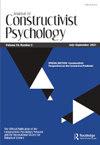The Development and Validation of the Meaning Approach Scale: Traditional, Functionalistic and Critical-Intuitive Approaches to Meaning in Life
IF 0.7
4区 心理学
Q3 PSYCHOLOGY, CLINICAL
引用次数: 0
Abstract
AbstractMany Indo-European languages refer to meaning in life with three groups of terms (e.g. vocation/significance/Bezeichnung, meaning/purpose/Meinung, sense/Sinn). These etymologies seem to refer to traditional, functionalistic and critical-intuitive/phenomenological approaches to life. This study aimed to develop and validate a psychometric instrument measuring traditional, functionalistic and critical-intuitive/phenomenological approaches to meaning in life. Eight experts developed consensus definitions and generated items for the Meaning Approach Scale (MAS) in a Delphi-study. A Three-Step-Test-Interview with eight participants, Confirmatory Factor Analysis and Item Response Theory in an informal survey of 108 participants, reduced the initial 56-item MAS-56 to MAS-45, with sub-scales for traditional, functionalistic and critical-intuitive/phenomenological approaches. The MAS-45 was validated in a survey of 1281 participants in 49 countries, with reliability, factor structure and correlations with other questionnaires as hypothesized. Traditional and functionalistic approaches correlated with negative affects, low quality-of-life and life satisfaction, whereas critical-intuitive/phenomenological approaches correlated with positive affects, quality-of-life and life satisfaction. Functionalistic approaches were reported more frequently in Western countries and traditional and critical-intuitive approaches in less Western countries. This study indicates the MAS-45 to be valid and reliable, differentiating three approaches to life. Individuals benefit most from a critical-intuitive/phenomenological approach, which therapists may consider exploring with clients.Keywords: Questionnaireexistentialwell-beingmeasurementpurpose in life Disclosure statementNo potential conflict of interest was reported by the author(s).意义接近量表的发展和验证:传统的、功能主义的和批判直觉的生活意义方法
摘要许多印欧语言用三组术语来指代生活中的意义(如:职业/意义/Bezeichnung、意义/目的/Meinung、意义/Sinn)。这些词源似乎指的是传统的、功能主义的和批判直觉/现象学的生活方式。本研究旨在开发和验证一种心理测量工具,测量传统的、功能主义的和批判直觉/现象学的生活意义方法。在delphi研究中,八位专家制定了共识定义并生成了意义接近量表(MAS)的项目。在108名参与者的非正式调查中,通过对8名参与者的三步测试-访谈、验证性因子分析和项目反应理论,将最初的56项MAS-56减少到MAS-45,并为传统、功能主义和批判性直觉/现象学方法提供了子量表。MAS-45在49个国家的1281名参与者的调查中得到了验证,其可靠性、因素结构和与其他问卷的相关性与假设一致。传统方法和功能主义方法与消极影响、低生活质量和生活满意度相关,而批判直觉/现象学方法与积极影响、生活质量和生活满意度相关。功能主义方法在西方国家更为常见,而传统和批判性直觉方法在西方国家较少。这项研究表明MAS-45是有效和可靠的,区分三种生活方式。个人从批判性直觉/现象学方法中获益最多,治疗师可能会考虑与客户一起探索这种方法。关键词:调查问卷存在幸福感测量人生目的披露声明作者未发现潜在的利益冲突
本文章由计算机程序翻译,如有差异,请以英文原文为准。
求助全文
约1分钟内获得全文
求助全文
来源期刊

Journal of Constructivist Psychology
PSYCHOLOGY, CLINICAL-
CiteScore
2.40
自引率
0.00%
发文量
22
期刊介绍:
Psychology and related disciplines throughout the human sciences and humanities have been revolutionized by a postmodern emphasis on the role of language, human systems, and personal knowledge in the construction of social realities. The Journal of Constructivist Psychology is the first publication to provide a professional forum for this emerging focus, embracing such diverse expressions of constructivism as personal construct theory, constructivist marriage and family therapy, structural-developmental and language-based approaches to psychology, and narrative psychology.
 求助内容:
求助内容: 应助结果提醒方式:
应助结果提醒方式:


